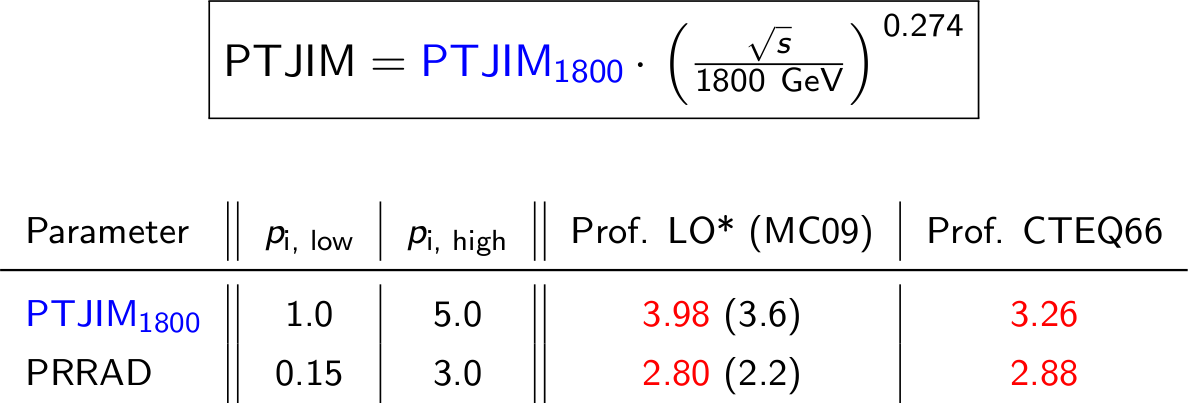This is a tuning of the two Jimmy parameters PTJIM (MPI cut-off) and
PRRAD = JMRAD(73) = JMRAD(93) (Proton/Antiproton radius).
The pdf used for this tuning is CTEQ66.
Further HERWIG-parameters were not touched.
The energy dependence of PTJIM and the tuning results as well as the
parameter sampling ranges (p_i,low/high) are given below. The exponent
energy of the energy dependence is fixed. The functional form is the
same as in Pythia.

CDF_2001_S4751469
=================
Field & Stuart Run I underlying event analysis.
Status: VALIDATED
Spires ID: 4751469
Spires URL: http://www.slac.stanford.edu/spires/find/hep/www?rawcmd=key+4751469
Experiment: CDF Tevatron Run 1
Year of publication: 2001
Authors:
Andy Buckley <andy.buckley@durham.ac.uk>
Description:
The original CDF underlying event analysis, based on decomposing each
event into a transverse structure with ``toward'', ``away'' and
``transverse'' regions defined relative to the azimuthal direction of the
leading jet in the event. Since the toward region is by definition
dominated by the hard process, as is the away region by momentum balance
in the matrix element, the transverse region is most sensitive to multi-
parton interactions. The transverse regions occupy $|\phi| \in
[60\degree, 120\degree]$ for $|\eta| < 1$. The pT ranges for the leading
jet are divided experimentally into the `min-bias' sample from 0--20 GeV,
and the `JET20' sample from 18--49 GeV.
Run details:
ppbar QCD interactions at 1800 GeV. The leading jet is binned from 0--49
GeV, and histos can usually can be filled with a single generator run
without kinematic sub-samples.
References:
Phys.Rev.D65:092002,2002
FNAL-PUB 01/211-E
CDF_2004_S5839831
=================
Transverse cone and 'Swiss cheese' underlying event studies
Status: VALIDATED
Spires ID: 5839831
Spires URL: http://www.slac.stanford.edu/spires/find/hep/www?rawcmd=key+5839831
Experiment: CDF Tevatron Run 2
Year of publication: 2004
Authors:
Andy Buckley <andy.buckley@durham.ac.uk>
Description:
This analysis studies the underlying event via transverse cones of $R =
0.7$ at 90 degrees in \phi relative to the leading (highest E) jet, at
sqrt(s) = 630 and 1800 GeV. This is similar to the 2001 CDF UE analysis,
except that cones, rather than the whole central \eta range are used. The
transverse cones are categorised as TransMIN and TransMAX on an event-by-
event basis, to give greater sensitivity to the UE component. 'Swiss
Cheese' distributions, where cones around the leading $n$ jets are
excluded from the distributions, are also included for $n = 2, 3$. This
analysis is useful for constraining the energy evolution of the
underlying event, since it performs the same analyses at two distinct CoM
energies.
Run details:
QCD events at sqrt(s) = 630 & 1800 GeV Several pTmin cutoffs are probably
required to fill the profile histograms, e.g. 0 (min bias), 30, 90, 150
GeV at 1800 GeV; and 0 (min bias), 20, 90, 150 GeV } at 630 GeV
References:
Phys. Rev. D70, 072002 (2004)
arXiv:hep-ex/0404004 - http://arxiv.org/abs/hep-ex/0404004
CDF_2008_LEADINGJETS
====================
CDF Run 2 underlying event in leading jet events
Status: VALIDATED
Spires ID: NONE
Spires URL: http://www.slac.stanford.edu/spires/find/hep/www?rawcmd=key+NONE
Experiment: CDF Tevatron Run 2
Year of publication: 2008
Authors:
Hendrik Hoeth <hendrik.hoeth@cern.ch>
Description:
Rick Field's measurement of the underlying event in leading jet events.
If the leading jet of the event is within $|\eta| < 2$, the event is
accepted and ``toward'', ``away'' and ``transverse'' regions are defined
in the same way as in the original (2001) CDF underlying event analysis.
The leading jet defines the $\phi$ direction of the toward region. The
transverse regions are most sensitive to the underlying event.
Run details:
ppbar QCD interactions at 1960 GeV. Particles with $c \tau > {}$10 mm
should be set stable. Several $p_\perp^\text{min}$ cutoffs are
probably required to fill the profile histograms. $p_\perp^\text{min} =
{}$ 0 (min bias), 10, 20, 50, 100, 150 GeV. The corresponding merging
points are at $p_T = $ 0, 30, 50, 80, 130, 180 GeV
D0_2004_S5992206
================
Run II jet azimuthal decorrelation analysis
Status: VALIDATED
Spires ID: 5992206
Spires URL: http://www.slac.stanford.edu/spires/find/hep/www?rawcmd=key+5992206
Experiment: D0 Tevatron Run 2
Year of publication: 2004
Authors:
Lars Sonnenschein <lars.sonnenschein@cern.ch>
Description:
Correlations in the azimuthal angle between the two largest pT jets have
been measured using the D0 detector in ppbar collisions at 1960 GeV. The
analysis is based on an inclusive dijet event sample in the central
rapidity region. The correlations are determined for four different pT
intervals.
Run details:
QCD events in ppbar interactions at sqrt(s) = 1960 GeV.
References:
Phys. Rev. Lett., 94, 221801 (2005)
arXiv:hep-ex/0409040 - http://arxiv.org/abs/hep-ex/0409040

